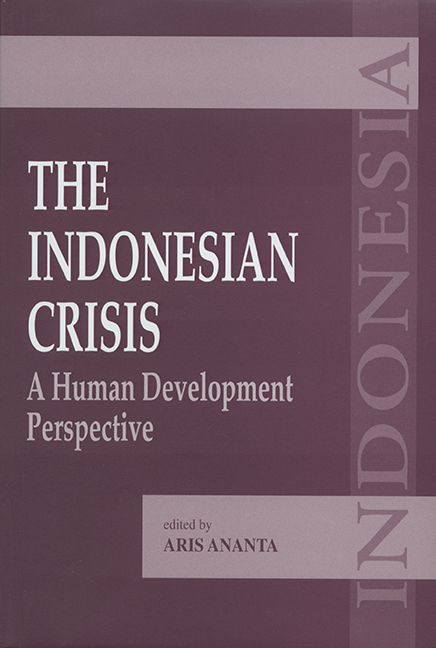Book contents
- Frontmatter
- Contents
- Acknowledgements
- List of Contributors
- Part I Introduction
- Part II Human Capital
- Part III Purchasing Power
- 9 Change in Consumer Price: Indonesian Cities, 1997–99
- 10 Social Safety Net Programmes in Indonesia: Some Efforts to Survive
- 11 State-Created Socio-Cultural Poverty: Lessons from Some Micro Studies
- 12 The Labour Market in Indonesia during the Crisis
- Part IV Emerging Issues
- Index
11 - State-Created Socio-Cultural Poverty: Lessons from Some Micro Studies
from Part III - Purchasing Power
Published online by Cambridge University Press: 21 October 2015
- Frontmatter
- Contents
- Acknowledgements
- List of Contributors
- Part I Introduction
- Part II Human Capital
- Part III Purchasing Power
- 9 Change in Consumer Price: Indonesian Cities, 1997–99
- 10 Social Safety Net Programmes in Indonesia: Some Efforts to Survive
- 11 State-Created Socio-Cultural Poverty: Lessons from Some Micro Studies
- 12 The Labour Market in Indonesia during the Crisis
- Part IV Emerging Issues
- Index
Summary
Introduction
There is great variation in the perceptions and evaluations on the economic crisis in Indonesia made by academicians and practitioners. How did the crisis affect the people's lives and how could it be solved? How was the socio-economic situation during 1998 and 1999? How vulnerable and miserable were the people at that time?
Mubyarto (2000) has shown that there are roughly two different views on the conditions during the crisis in 1997–99. The first is the doomsday view, which perceives the situation as being catastrophic and devastating. The second is the “not that bad” view, which sees Indonesians suffering but not that much.
The doomsday view is usually macroeconomic in nature. The drastic drop in the value of the rupiah, the sky-rocketing prices, the collapse of the banking system, the fall in foreign reserves, the high rate of unemployment, and its drastic increase are some examples of indicators often cited as signs of the collapse of the macroeconomy. Policy-making, including recommendations by foreign institutions such as the International Monetary Fund (IMF), is also often based on this macroeconomic point of view.
On the other hand, the “not that bad” view is reflected in the almost “business as usual” activities of many people, especially among the middle and lower income groups. Both traditional markets and modern supermarkets are as crowded as before. Traffic in Jakarta is as bad as before the crisis. Small and medium-sized firms, including those in the informal sectors, continue to make profit. The poor, who had been poor even before the crisis, may not have noticed the difference between the crisis and non-crisis periods.
This chapter argues that the doomsday view was the underlying factor in policy-making (by both Indonesian and international institutions) during at least the first half of 1998. With this assumption, the Government of Indonesia, helped by international donor agencies, established the SSN (Social Safety Net) programme, to help people cope with the crisis. However, this chapter attempts to show that the SSN programme has created socio-cultural poverty among the people. This discussion is based on anthropological research carried out in some rural areas in Central Java and Yogyakarta. The results may not be applicable for other areas in Indonesia, but it can provide important lessons in formulating programmes to help the people.
- Type
- Chapter
- Information
- The Indonesian CrisisA Human Development Perspective, pp. 296 - 312Publisher: ISEAS–Yusof Ishak InstitutePrint publication year: 2002



